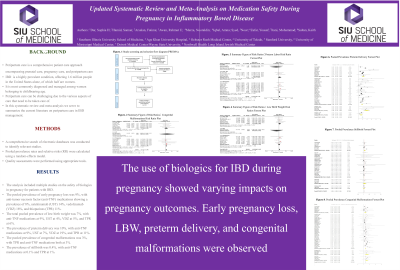Monday Poster Session
Category: IBD
P2169 - Updated Systematic Review and Meta-Analysis on Medication Safety During Pregnancy in Inflammatory Bowel Disease
Monday, October 23, 2023
10:30 AM - 4:15 PM PT
Location: Exhibit Hall

Has Audio

Sophia Dar, MD
Northshore-Long Island Jewish Medical Center
Springfield , IL
Presenting Author(s)
Sophia Haroon Dar, MD1, Saman Hamid, MD2, Fatima Arsalan, MD2, Rehmat Ullah Awan, MD3, Nooraldin Merza, MD4, Amna Iqbal, MD4, Noor Syed, MD5, Yousaf Zafar, MD6, Mohammad Itani, MD7, Keith S. Sultan, MD8
1Northshore-Long Island Jewish Medical Center, New York, NY; 2Aga Khan University Medical Center, Karachi, Sindh, Pakistan; 3Ochsner Rush Medical Center, Meridian, MS; 4University of Toledo, Toledo, OH; 5Santa Clara Valley Medical Center, Saratoga, CA; 6University of Mississippi Medical Center, Jackson, MS; 7Detroit Medical Center/Wayne State University, Detroit, MI; 8Northwell Health, Great Neck, NY
Introduction: This systematic review and meta-analysis aimed to evaluate the safety of current medications for inflammatory bowel disease (IBD) during pregnancy, specifically assessing their impact on early pregnancy loss, low birth weight (LBW), preterm delivery, congenital malformations, and stillbirth.
Methods: A comprehensive search of electronic databases was conducted to identify relevant studies. Pooled prevalence rates and relative risks (RR) were calculated using a random-effects model. Quality assessments were performed using appropriate tools.
Results: The analysis included multiple studies on the safety of biologics in pregnancy for patients with IBD. The pooled prevalence of early pregnancy loss was 9%, with anti-tumor necrosis factor (anti-TNF) medications showing a prevalence of 8%, ustekinumab (UST) 14%, vedolizumab (VDZ) 18%, and thiopurines (TPR) 11%. The total pooled prevalence of low birth weight was 7%, with anti-TNF medications at 9%, UST at 4%, VDZ at 5%, and TPR at 6%. The prevalence of preterm delivery was 10%, with anti-TNF medications at 9%, UST at 7%, VDZ at 19%, and TPR at 11%. The pooled prevalence of congenital malformations was 3%, with TPR and anti-TNF medications both at 3%. The prevalence of stillbirth was 0.4%, with anti-TNF medications at 0.1% and TPR at 1%.
Discussion: The safety of IBD treatments is essential for physicians and providers managing IBD during pregnancy. Our study is comparable with prior meta-analyses showing that biologics safety in IBD is comparable to the general population

Disclosures:
Sophia Haroon Dar, MD1, Saman Hamid, MD2, Fatima Arsalan, MD2, Rehmat Ullah Awan, MD3, Nooraldin Merza, MD4, Amna Iqbal, MD4, Noor Syed, MD5, Yousaf Zafar, MD6, Mohammad Itani, MD7, Keith S. Sultan, MD8. P2169 - Updated Systematic Review and Meta-Analysis on Medication Safety During Pregnancy in Inflammatory Bowel Disease, ACG 2023 Annual Scientific Meeting Abstracts. Vancouver, BC, Canada: American College of Gastroenterology.
1Northshore-Long Island Jewish Medical Center, New York, NY; 2Aga Khan University Medical Center, Karachi, Sindh, Pakistan; 3Ochsner Rush Medical Center, Meridian, MS; 4University of Toledo, Toledo, OH; 5Santa Clara Valley Medical Center, Saratoga, CA; 6University of Mississippi Medical Center, Jackson, MS; 7Detroit Medical Center/Wayne State University, Detroit, MI; 8Northwell Health, Great Neck, NY
Introduction: This systematic review and meta-analysis aimed to evaluate the safety of current medications for inflammatory bowel disease (IBD) during pregnancy, specifically assessing their impact on early pregnancy loss, low birth weight (LBW), preterm delivery, congenital malformations, and stillbirth.
Methods: A comprehensive search of electronic databases was conducted to identify relevant studies. Pooled prevalence rates and relative risks (RR) were calculated using a random-effects model. Quality assessments were performed using appropriate tools.
Results: The analysis included multiple studies on the safety of biologics in pregnancy for patients with IBD. The pooled prevalence of early pregnancy loss was 9%, with anti-tumor necrosis factor (anti-TNF) medications showing a prevalence of 8%, ustekinumab (UST) 14%, vedolizumab (VDZ) 18%, and thiopurines (TPR) 11%. The total pooled prevalence of low birth weight was 7%, with anti-TNF medications at 9%, UST at 4%, VDZ at 5%, and TPR at 6%. The prevalence of preterm delivery was 10%, with anti-TNF medications at 9%, UST at 7%, VDZ at 19%, and TPR at 11%. The pooled prevalence of congenital malformations was 3%, with TPR and anti-TNF medications both at 3%. The prevalence of stillbirth was 0.4%, with anti-TNF medications at 0.1% and TPR at 1%.
Discussion: The safety of IBD treatments is essential for physicians and providers managing IBD during pregnancy. Our study is comparable with prior meta-analyses showing that biologics safety in IBD is comparable to the general population

Figure: Summary Table of Pregnancy Outcomes with each medication type
Disclosures:
Sophia Haroon Dar indicated no relevant financial relationships.
Saman Hamid indicated no relevant financial relationships.
Fatima Arsalan indicated no relevant financial relationships.
Rehmat Ullah Awan indicated no relevant financial relationships.
Nooraldin Merza indicated no relevant financial relationships.
Amna Iqbal indicated no relevant financial relationships.
Noor Syed indicated no relevant financial relationships.
Yousaf Zafar indicated no relevant financial relationships.
Mohammad Itani indicated no relevant financial relationships.
Keith Sultan indicated no relevant financial relationships.
Sophia Haroon Dar, MD1, Saman Hamid, MD2, Fatima Arsalan, MD2, Rehmat Ullah Awan, MD3, Nooraldin Merza, MD4, Amna Iqbal, MD4, Noor Syed, MD5, Yousaf Zafar, MD6, Mohammad Itani, MD7, Keith S. Sultan, MD8. P2169 - Updated Systematic Review and Meta-Analysis on Medication Safety During Pregnancy in Inflammatory Bowel Disease, ACG 2023 Annual Scientific Meeting Abstracts. Vancouver, BC, Canada: American College of Gastroenterology.
